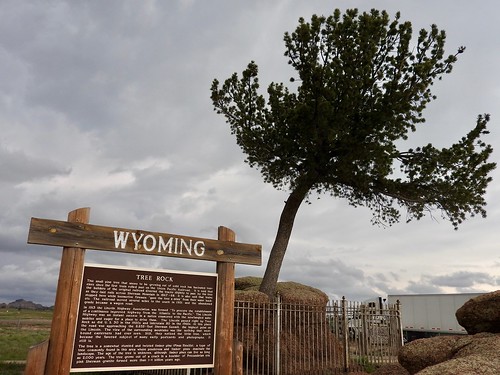A few years back, my family and I took a "Griswold Family Road Trip" and traveled in our van from Nebraska to San Francisco, up the Oregon and Washington coast, through the northern panhandle of Idaho, and then through Montana and Wyoming on our way back home. We spent two weeks reconnecting as a family and enjoying parts of the beautiful landscape that we encountered on our tour of the western United States. We did what all families do when they are in close proximity to one another for an extended period of time: we laughed, we cried, and we fought. Through it all, however, we grew closer and we were able to build a memory that none of us will ever forget.
Among the many stops we made on our trip, one of my favorite places was in Buford, Wyoming along the I-80 corridor. There, the interstate splits and there is a gathering place for people to stop and look at the "Tree in a Rock." This "literal" roadside attraction tells the story of a pine tree that sprouted from a large granite boulder and was discovered in the 1860’s by railroad workers who were laying track for the Union Pacific. As you might imagine, it is definitely a site to see and it leaves you wondering how something like this could even happen. I was reminded of this phenomenon just recently through a Facebook Memories caption that popped up on my account and, as usual, it got me thinking about how it is relevant to school culture. You see, a rock by its very nature should not be able to sustain life because it is hard and impenetrable. Even granite, which is a porous rock, shouldn't really be able to have a seed planted in it and allow a tree, complete with a root system, sprout from it without having the rock crumble around it. A "tree in a rock" is a paradox, yet there is a proof that it is possible. In fact, not only is it possible, it is sustainable over thousands of years.
Schools develop cultures over time that harden like rocks. They develop traditions and ways of operating that become cultural norms. Over time, as people leave and new people come into the organization, these cultural norms become the backbone of the organization and help people have a sense of stability and consistency. That is why school cultures are so hard change. As people come into organizations or begin to question why things are done the way they are done, the typical response is, "That is way we have always done it." Any thought of growth or change is stifled by the overwhelming sentiment that if it isn't broke, then don't try to fix it. These school cultures are places where a few people make all of the decisions without providing a reason why and everyone else complies and criticizes the decisions and/or decision makers. These are schools that opt to stick with the status quo of their culture because it is familiar, it doesn't require much flexibility, it doesn't require people to change much, and it is easy. These are school cultures that typically operate from the standpoint that any new idea will run its course and go by the wayside in the long run because history has told them them that is the case.
Well, as a leader, I won't accept that. I would rather adopt the "Tree in a Rock" approach to school culture. I want to embrace the hard work and the messiness that is involved in developing a school culture where everyone's voice can be heard and a tree can sprout amid a hardened core. I want to work in a culture that is porous enough to allow for seeds to be planted and grow in spite of inhospitable variables that will go to any lengths to stifle the growth. I want to be surrounded by people who embrace this as well and look forward to the hard work that is involved in growing a tree from a rock base. A culture where, regardless of who makes the final decision, everyone feels as if they have an opportunity to voice their thoughts and feelings without fear of retribution or being alienated. Creating this kind of culture is not easy. It is, in fact, the HARDEST work a school can do, but also the most important. As John F. Kennedy once said in his famous moonshot speech at Rice University in 1962, "We choose to go to the moon. We choose to go to the moon in this decade and do the other things, not because they are easy, but because they are hard, because that goal will serve to organize and measure the best of our energies and skills, because that challenge is one that we are willing to accept, one we are unwilling to postpone, and one which we intend to win.”
I want to grow a Tree in a Rock. How about you?
#OwnYourEpic #Embrace





No comments:
Post a Comment